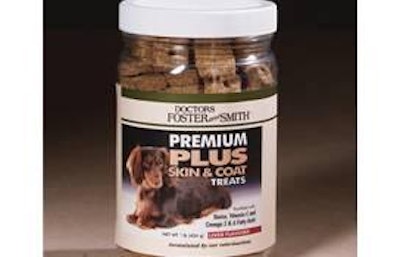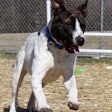
Skin and Coat Supplements for Dogs & Cats FAQ
Why are skin and coat supplements beneficial for pets?
Many pets do not receive the required nutrition to maintain healthy skin and haircoat, or they have higher needs for certain nutrients than the average dog. Skin and coat supplements provide the cells of the skin with the necessary nutrients to remain healthy. Many skin and coat supplements contain fatty acids, vitamins, and minerals to support a beautiful, shiny coat and supple, healthy skin.
What are fatty acids?
Fatty acids are specific types of polyunsaturated fats. The two main classes of fatty acids related to skin and coat are the Omega-3s and the Omega-6s. These classifications are based on molecular characteristics.
Which fatty acids do pets need?
Animals can produce some of the fatty acids they need, but not all of them. Those fatty acids that they cannot produce themselves, but must be obtained through their diet, are called "essential" fatty acids. Interestingly, what is "essential" for one species of animal is not necessarily essential for another. For example, the fatty acid arachidonic acid is essential for cats but not for dogs.
In some disease conditions, certain enzymes, which convert one fatty acid to another, may be deficient, or the animal may not be able to adequately absorb fatty acids from the intestine. In animals with these conditions, some of the "nonessential" fatty acids actually become "essential," that is, required in the diet, and in higher amounts. Deficiencies of fatty acids may also occur with the use of fat-restricted diets in overweight dogs.
How do fatty acids affect pet's skin and haircoat?
Supplementation with certain Omega-3 and Omega-6 fatty acids can help support a sleek, healthy coat and supple skin.
For what conditions are Omega-3 fatty acids recommended?
Research has shown that the Omega-3 fatty acids called EPA and DHA appear to have the most benefit for inflammatory conditions. Discuss these possibilities with your veterinarian.
Why are low-fat diets recommended for pets being supplemented with Omega-3 fatty acids?
Omega-3 supplements will work best when given with a low-fat diet so we can improve the ratio of Omega-6 fatty acids to Omega-3 fatty acids. The diet normally contains large amounts of Omega-6 fatty acids and lesser amounts of Omega-3s. By adding Omega-3s via a supplement and decreasing the amount of dietary Omega-6s, a better ratio of the two can be obtained.
How long does it take for skin and coat supplements to work?
It can take as long as 12 weeks to determine whether the supplementation is working.
Are there any side effects from skin and coat supplements?
In large doses, they may cause some loose stool. If that occurs, stop and start again with a very low dose and gradually increase the dose so your pet will get used to it.


















